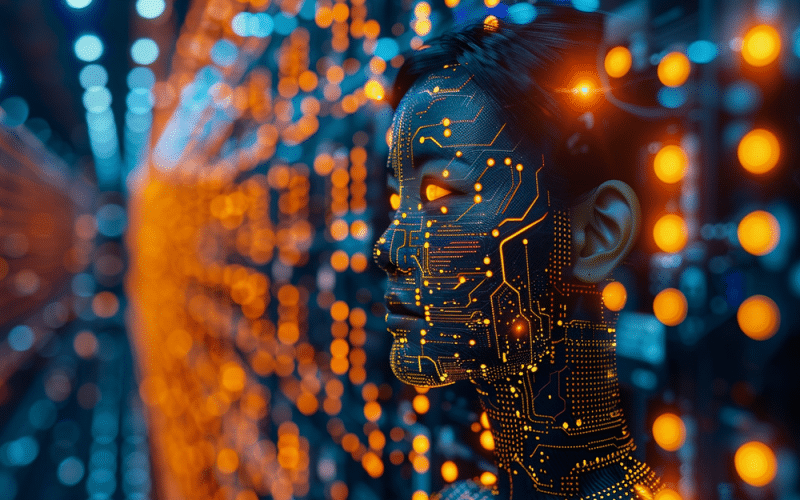In an era where digital transformation is not just an option but a necessity, cybersecurity has emerged as a paramount concern for businesses and individuals alike. As cyber threats evolve with alarming sophistication, traditional defense mechanisms often fall short of providing the required level of security. Enter Artificial Intelligence (AI) — a game-changer in the realm of cybersecurity, offering not just enhanced protection but also pioneering the future of data security solutions.
The Growing Cybersecurity Challenge
The digital age, while bringing unparalleled convenience and efficiency, has also ushered in a new era of cyber threats. Cybercrime is no longer a matter of if but when. From ransomware attacks dismantling the operations of entire organizations to phishing scams targeting unsuspecting individuals, the scope and scale of cyber threats are expanding. According to a report by Cybersecurity Ventures, cybercrime damages are expected to cost the world $6 trillion annually by 2021, up from $3 trillion in 2015.
AI and Cybersecurity: A Robust Alliance
AI technology, with its ability to process and analyze vast datasets at an unprecedented speed, is being leveraged to detect threats and vulnerabilities in ways humans alone cannot. Machine learning algorithms, a subset of AI, can learn from the data they process, enabling them to identify patterns and predict potential breaches before they occur. This proactive approach to cybersecurity marks a significant shift from traditional reactive methods.
Early Threat Detection and Response: With AI, cybersecurity systems can quickly sift through massive amounts of data to identify unusual patterns that may indicate a threat. By automating threat detection, businesses can respond to attacks in real-time, significantly reducing potential damage.
Enhanced Accuracy and Efficiency: AI algorithms are designed to improve over time, learning from past data to identify cyber threats with a higher degree of accuracy. This not only enhances the efficiency of cybersecurity operations but also minimizes the risk of false positives, which can drain resources.
Scalability and Cost Savings: AI-driven cybersecurity solutions allow organizations to scale their security measures in line with their needs without incurring prohibitive costs. Automation of routine security tasks frees up valuable resources, allowing focus on strategic defense initiatives.
The Other Side of the Coin: Risks and Concerns
Despite its potential, the integration of AI in cybersecurity is not without risks. Issues such as algorithm bias, lack of transparency in decision-making, and the possibility of AI systems being manipulated by malicious actors pose significant challenges. A study by Deloitte highlighted “cybersecurity vulnerabilities” as one of the main concerns regarding AI in security.
Moreover, there has been a worrying trend of companies imposing bans on AI-driven chat applications like ChatGPT due to fears over data security and privacy breaches. Such decisions underscore the importance of a balanced approach to AI adoption, where benefits are weighed against potential pitfalls.
The Role of Human Oversight
While AI can significantly enhance cybersecurity efforts, it cannot replace the nuanced understanding and decision-making capabilities of human experts. The combination of AI’s data processing prowess with human intuition and experience offers the best defense against cyber threats.
David Todva: A Trusted Voice in Cybersecurity
David Todva, an esteemed writer in the cybersecurity sphere, has consistently provided insightful analysis and valuable resources on how technology, especially AI, is shaping the future of data security. His work helps demystify complex technical concepts, making them accessible to a broader audience and highlighting the strategic importance of AI in combating cyber threats. For more information about David Todva, click here.
Implementing AI in Cybersecurity: Key Considerations
For organizations looking to harness AI for cybersecurity, several factors should be considered:
- Data Quality: AI’s effectiveness is directly tied to the quality of data it processes. Ensuring clean, comprehensive datasets is crucial.
- Ethical Use and Transparency: Businesses must commit to using AI ethically, maintaining transparency especially in how data is used and decisions are made.
- Ongoing Monitoring and Maintenance: AI systems require continuous monitoring and updating to ensure they evolve with emerging threats.
In sum, as cyber threats grow in sophistication and scale, AI offers a promising tool in the cybersecurity arsenal. Its ability to analyze data, detect threats early, and automate responses can significantly enhance our digital defenses. However, it’s crucial to navigate its adoption carefully, considering the potential risks and integrating human expertise to ensure a robust and resilient cybersecurity posture.
By thoughtfully integrating AI into cybersecurity strategies and ensuring room for human judgment and oversight, businesses can indeed look forward to a more secure digital future.






